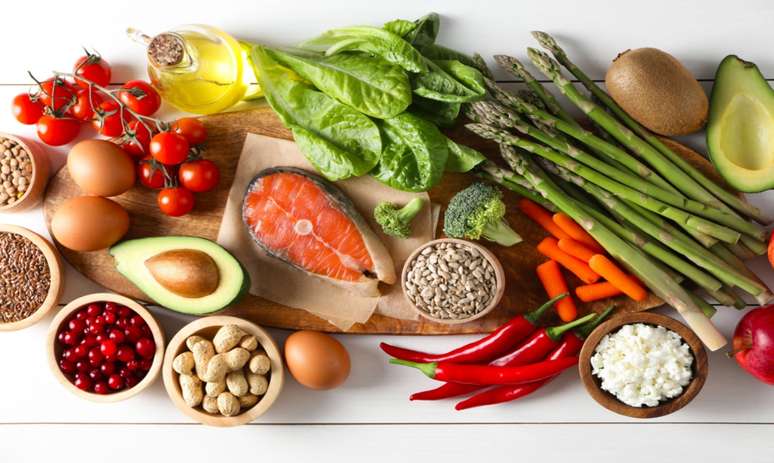Inflammation of the body causes symptoms such as fatigue and low immunity. Find out which foods can help
Weak immunity, fatigue, and feeling low energy are some of the symptoms of inflammation in the body. This condition is associated with a number of problems, such as cardiovascular disease, high blood pressure, anxiety, depression, type 2 diabetes, some types of cancer, and obesity. Therefore, it is important to combat this inflammatory process, which can be done by adding certain foods to your routine.
According to nutritionist Adriana Stavro, to reduce or prevent inflammation, it is important to maintain a diet based on nutrient-dense foods containing antioxidants. “An anti-inflammatory diet should provide a healthy balance of proteins, carbohydrates, fats, vitamins, minerals, and fiber. That is, prioritizing foods with anti-inflammatory properties,” she explains.
13 foods that deflate the body
In this sense, the specialist indicates some options to include in the diet. Look:
1. Purple grapes
Grapes contain resveratrol, a plant compound with anti-inflammatory and antioxidant properties. They may also reduce the risk of heart disease, diabetes, obesity, Alzheimer’s disease, and eye disease.
2. Red fruits
Red fruits, such as blueberries, strawberries, raspberries, or blackberries, contain several essential micronutrients, such as fiber, polyphenols, and antioxidants (anthocyanins), compounds that fight inflammation. Not only do they reduce existing inflammation, but they also prepare cells to better respond to any future inflammation.
3. Broccoli
Broccoli and other cruciferous vegetables, such as cauliflower and Brussels sprouts, for example, are rich in vitamins K, C, potassium, magnesium, fiber, and sulforaphane. According to the nutritionist, the potential protective role of cruciferous vegetables and the active components present in these vegetables have been extensively studied. And the results have shown that this class of vegetables can even delay the development of cancer.
4. Omega-3
Salmon and other fatty fish are rich in omega-3 fatty acids (W3). According to Stavro, the anti-inflammatory properties of W3 help prevent and treat conditions such as coronary artery disease, diabetes, inflammatory bowel disease, Alzheimer’s, bipolar disorder, schizophrenia, and cystic fibrosis. W3 is also helpful for autoimmune diseases such as lupus, rheumatoid arthritis, type 1 diabetes, ulcerative colitis, psoriasis, and multiple sclerosis.
5. Turmeric
Turmeric, the rhizome of Curcuma longa, is a tasty yellow-orange spice. The components of turmeric are curcuminoids and the most important is curcumin.
According to the expert, it has been used in alternative medicine for centuries, as it is non-toxic and has several therapeutic properties, including anti-inflammatory, antioxidant, antimicrobial, hepatoprotective, immunostimulant, antiseptic, analgesic and anticancerogenic.
6. Pumpkin seeds
Pumpkin seeds contain polyunsaturated fatty acids, potassium, vitamin B2 (riboflavin), folate, vitamin E and carotenoids, which are antioxidants, vitamins and minerals essential for the immune system. They are delicious as a snack, but also complement salads or soups.
7. Green leafy vegetables
Spinach, kale, Swiss chard and arugula are foods rich in antioxidants, vitamins and nutrients, including folate, fiber, vitamins A, C, E and K. It is worth remembering that increasing the consumption of fruits and vegetables is the key component of a healthy diet to reduce the risk of serious chronic diseases such as cancer and cardiovascular disease (CVD), the leading causes of death in the world.
8. Avocado
Avocados are a source of healthy fats (monounsaturated), which help reduce cholesterol and joint inflammation. In addition, avocados also contain vitamins K, C and E, manganese, selenium and zinc. The various nutrients contained in the fruit have also been shown to be useful in the prevention of neurodegenerative diseases such as Alzheimer’s and Parkinson’s.
9. Green tea
Green tea is rich in catechins. According to Stavro, research suggests that catechins are anti-inflammatory compounds that prevent the formation of free radicals, inhibit the formation of tumor cells, promote the growth of beneficial bacteria in the gut, and reduce the risk of Alzheimer’s.
10. Tomatoes
Tomatoes are a source of lycopene, a pigment that gives red and pink fruits their color. It also has antioxidant properties associated with heart health benefits and protection against sunburn and certain types of cancer.
11. Whole grains
These grains contain more fiber, protein, selenium, potassium, and magnesium than refined grains. They also have a lower glycemic index, which minimizes the inflammatory effects seen with extreme and constant blood sugar fluctuations. Additionally, a diet rich in whole grains helps control weight.
12. Extra virgin olive oil
According to the nutritionist, olive oil contains about 36 phenolic compounds, and it is this phenolic fraction that is responsible for the anti-inflammatory, antioxidant, and antimicrobial benefits. The main anti-inflammatory effects of olive oil are mediated by antioxidants. The highlight is “oleocanthal, which has been shown to act similarly to the anti-inflammatory drug ibuprofen,” says Stavro.
13.Chia
Chia seeds are known as a superfood. They provide all nine essential amino acids and are therefore a high-quality plant-based protein. More than 80% of the carbohydrate content of the seeds is in the form of fiber. The fiber is mainly of the soluble type, which is responsible for the sticky texture of the moistened seeds.
This fiber can be fermented in the intestines, promoting the formation of short-chain fatty acids (SCFA) and improving colon health. Another important feature of chia is its high omega-3 content. In fact, chia is the most well-known plant source of W-3, even better than flaxseed.
The minerals that stand out most are: manganese, essential for metabolism, growth and development; phosphorus, which contributes to bone health and tissue maintenance; copper, important for heart health; selenium, an important antioxidant and calcium, essential for bones, muscles and nerves.
Source: Terra
Ben Stock is a lifestyle journalist and author at Gossipify. He writes about topics such as health, wellness, travel, food and home decor. He provides practical advice and inspiration to improve well-being, keeps readers up to date with latest lifestyle news and trends, known for his engaging writing style, in-depth analysis and unique perspectives.








